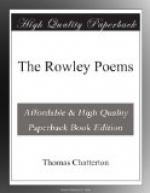The question therefore concerning the authenticity of these Poems must now be decided by an examination of the fragments upon vellum, which Mr. Barrett received from Chatterton as part of his original MSS., and by the internal evidence which the several pieces afford. If the Fragments shall be judged to be genuine, it will still remain to be determined, how far their genuineness should serve to authenticate the rest of the collection, of which no copies, older than those made by Chatterton, have ever been produced. On the other hand, if the writing of the Fragments shall be judged to be counterfeit and forged by Chatterton, it will not of necessity follow, that the matter of them was also forged by him, and still less, that all the other compositions, which he professed to have copied from antient MSS., were merely inventions of his own. In either case, the decision must finally depend upon the internal evidence.
It may be expected perhaps, that the Editor should give an opinion upon this important question; but he rather chooses, for many reasons, to leave it to the determination of the unprejudiced and intelligent Reader. He had long been desirous that these Poems should be printed; and therefore readily undertook the charge of superintending the edition. This he has executed in the manner, which seemed to him best suited to such a publication; and here he means that his task should end. Whether the Poems be really antient, or modern; the compositions of Rowley, or the forgeries of Chatterton; they must always be considered as a most singular literary curiosity.
[Footnote 1: The history of this youth is so intimately connected with that of the poems now published, that the Reader cannot be too early apprized of the principal circumstances of his short life. He was born on the 20th of November 1752, and educated at a charity-school on St. Augustin’s Back, where nothing more was taught than reading, writing, and accounts. At the age of fourteen, he was articled clerk to an attorney, with whom he continued till he left Bristol in April 1770.
Though his education was thus confined, he discovered an early turn towards poetry and English antiquities, particularly heraldry. How soon he began to be an author is not known. In the Town and Country Magazine for March 1769, are two letters, probably, from him, as they are dated at Bristol, and subscribed with his usual signature, D.B. The first contains short extracts from two MSS., “written three hundred years ago by one Rowley, a Monk” concerning dress in the age of Henry II; the other, “ETHELGAR, a Saxon poem” in bombast prose. In the same Magazine for May 1769, are three communications from Bristol, with the same signature, D.B. viz. CERDICK, translated from the Saxon (in the same style with ETHELGAR), p. 233.—Observations upon Saxon heraldry, with drawings of Saxon atchievements, &c. p. 245.—ELINOURE and JUGA, written three hundred years ago by T. ROWLEY, a secular priest, p. 273. This last poem is reprinted in this volume, p. 19. In the subsequent months of 1769 and 1770 there are several other pieces in the same Magazine, which are undoubtedly of his composition.




